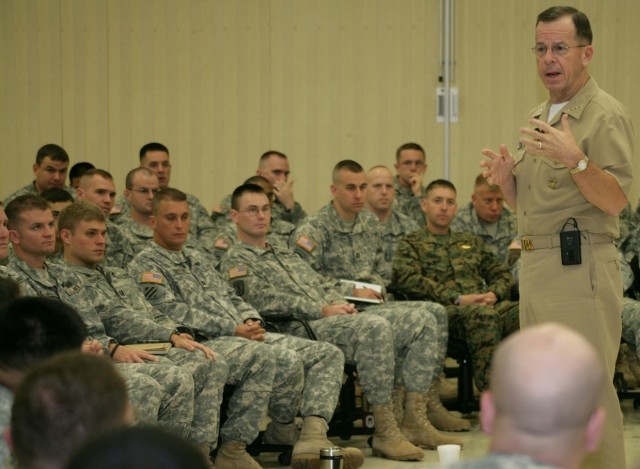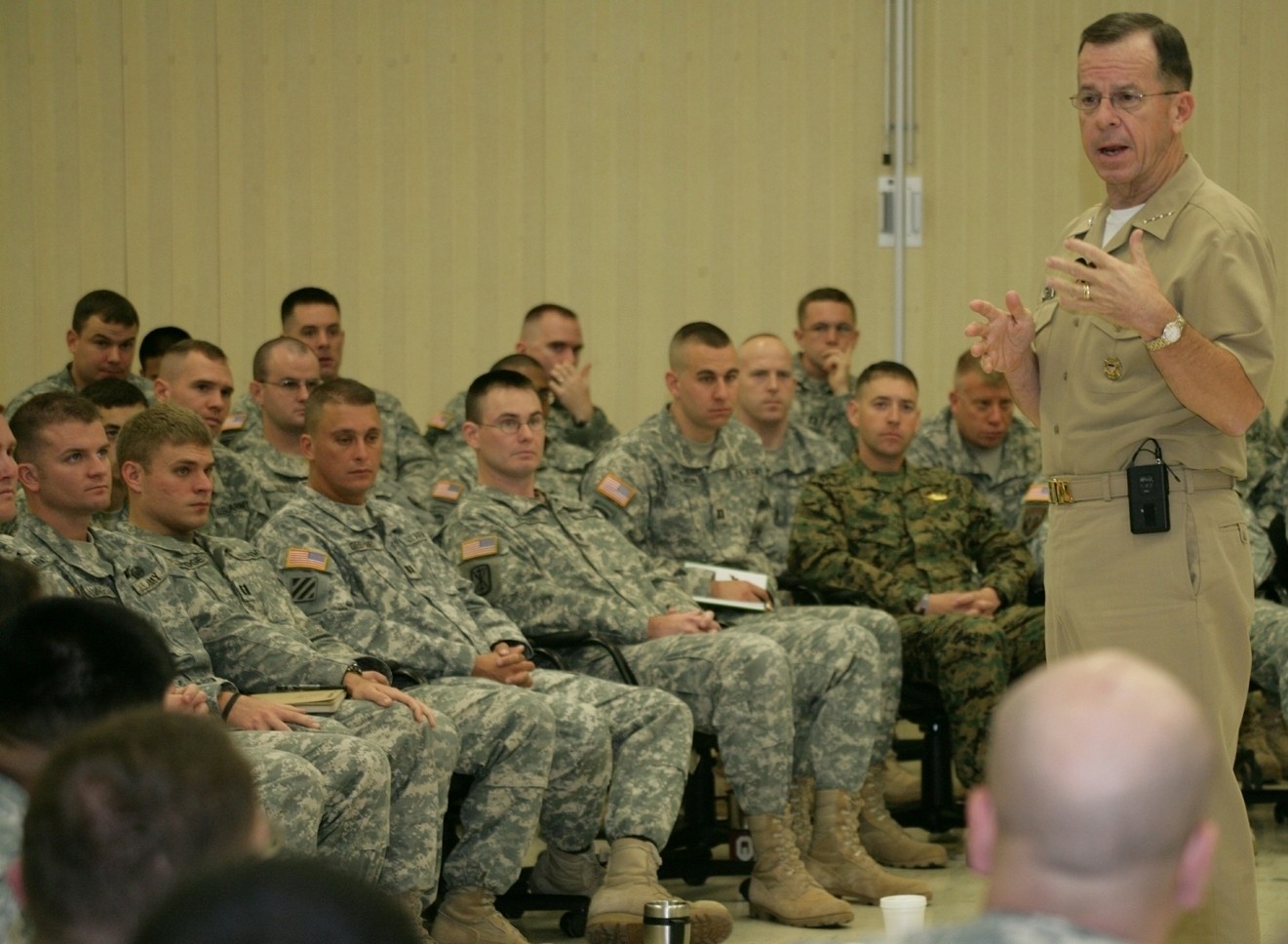FORT SILL, Okla. (Army News Service, Oct. 25, 2007) -- The new chairman of the Joint Chiefs of Staff, Adm. Michael G. Mullen, visited Fort Sill Oct. 23 as part of a two-day trip in which he also made stops at forts Leavenworth and Riley, Kan.
During his stop at Fort Sill, Mullen met with Maj. Gen. Peter Vangjel, U.S. Fires Center of Excellence and Fort Sill commanding general, and spoke with officers in the Captain's Career Course. He asked for frank and honest questions about concerns of the Soldiers.
The Army recently started giving captains a retention bonus to keep them from leaving the service.
"I think it's great," said Capt. Jeremy Conner, career course student about the admiral's visit.
"It shows that he actually wants to see what's going on and what we think about everything that's going on with the military."
Adm. Mullen was appointed as chairman only three weeks ago and has made trips to Iraq and Afghanistan, but the quick trip to southwest Oklahoma is his first trip as chairman to Army posts within the United States.
The chairman said, besides the war, his priority is resetting the force.
"I want to hear what's going on, particularly with the ground forces," Adm. Mullen told the Soldiers at the beginning of the session. "It isn't that I haven't spent time with ground forces before, but I haven't in the last couple of years."
Adm. Mullen said he would "like to be perfectly predictive," but promised no quick fixes. Once the question and answer period started, media were asked not to use the students names to encourage them to speak freely.
The student captains had enough time to ask nearly 30 questions. The top on everyone's list was deployments and dwell time between deployments. One captain told the chairman that a one-year dwell time "wasn't good enough."
The chairman said military leaders hope to change the 15-month deployment to one year home ratio in the near future.
"We've got to get to a minimum of one (year deployment) to one (year at home) as rapidly as possible," he said. "Eventually, we've got to get to 12-month deployments and 15 months back."
The chairman looked back at the captain and said, "I got it, one-to-one is not good enough."
Another captain told the admiral that the repeated deployments and short dwell time between are draining his family. "I don't have a problem with it. It's what I do," said the captain. He went on to say the constant coming and going has become a burden for his family.
"We can't not take family considerations into account," Adm. Mullen said.
Many of the captains have been deployed two or three times to Iraq in their short careers as Army officers. One captain asked if there is a limit to how much time a Soldier can spend deployed. He asked the chairman if there was a time when you just say, "enough."
"That reminds me of the old days, the disgust you hear from families. That is just not the case in 2007. It can't be, if we're going to have a healthy force."
The Solders' questions ranged from problems with the post hospital to larger issues like recruitment and the military presence in Iraq. The question of Army recruiting was brought up when a captain said he spent all day training, while deployed, and much of the night taking care of discipline actions. The students told the chairman it was because the standards for new recruits have gone down.
"Making sure we do not break our military is a huge priority for me," Mullen, a Vietnam veteran, said. He said he would look at discipline statistics to see the impact of current recruiting standards.
Adm. Mullen told the Soldiers and Marines that the ground forces are the "center of gravity" for the war and understands that many of them are doing non-traditional duties while deployed. At the same time, Adm. Mullen's wife, Deborah, joined him on the trip and met with the wives of young officers to hear their concerns and issues.
The chairman challenged the officers to use their time at school to come up with answers and present them to their commanders.
"I don't offer instantaneous solutions, but I know what's on your mind," he said.
After Fort Sill, the chairman stopped at Fort Leavenworth and Fort Riley, Kan.
(Keith Pannell writes for the Cannoneer newspaper at Fort Sill. This article also appears in the TRADOC News Service.)
See<a href="http://www.army.mil/-news/2007/10/25/5768-joint-chiefs-chairman-visits-fort-riley/index.html"> Joint Chiefs Chairman Visits Fort Riley</a>.
See <a href="http://www.army.mil/-news/2007/10/25/5769-jcs-chairman-at-leavenworth-leaders-can-fix-issues/index.html"> JCS Chairman at Leavenworth: Leaders Can Fix Issues</a>.


Social Sharing